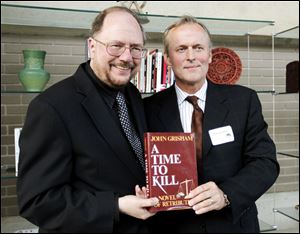
Grisham's 'A Time to Kill' becomes stage production
5/26/2011
Writer John Grisham, right, and playwright Rupert Holmes pose for photographers with Grisham book 'A Time to Kill,' during the opening of the world premier of the stage adaption of 'A Time To Kill.'
WASHINGTON -- A novel that once drew a pile of rejection letters from major publishers and was slow to sell when it was finally printed will have another life onstage.
A Time to Kill, John Grisham's first novel, went on to sell more than 15 million copies after the success of his second book, The Firm. It was made into a 1996 movie starring Matthew McConaughey, Sandra Bullock, and Samuel L. Jackson.
Now, the story Grisham once saw unfold at the DeSoto County Courthouse in Mississippi -- a father taking the law into his own hands, killing the men who raped his young daughter -- has been remade by Washington's Arena Stage. It's the first theatrical adaptation of a Grisham novel after a series of hit movies made from his legal thrillers.
"If it's bad, don't blame me, I had nothing to do with it," Grisham joked at the play's opening on Sunday. "If it's great, I intend to take all the credit because I wrote the damn book!"
Grisham had a hunch, though, that it might work. He once told his agent that his first book might make for good theater, and in 2009, they found a Grisham fan in producer Daryl Roth, who has made six Pulitzer Prize-winning plays. She was interested immediately.
"For me, A Time to Kill has a lot of issues that need to be discussed, need to be a part of our national dialogue," Roth said, from issues of race and justice to parents protecting the rights of their children.
Then came the task of boiling down 600-plus pages to two acts and a cast of 15. Roth chose Tony Award-winning playwright Rupert Holmes for the job.
Holmes conferred with Grisham by phone and e-mail before sharing the first draft. The lawyer-turned-author handed back legal notes on the script. Since then, Grisham has mostly left the story to Holmes.
The play is set primarily as a courtroom drama. Holmes said he was fascinated by the interplay of law and justice "and how those two words aren't always the same thing."
For the black defendant, Carl Lee Hailey, seeking justice for his daughter meant killing the two white men who raped her before they could be tried in court. Glimpses of the town's uproar over the case and threats by the Ku Klux Klan are brought into the courthouse through TV news reports and a few divergent scenes.
"This first novel of his was pungent and vital and rowdy and humorous, believe it or not," Holmes said. "Working with this material, I couldn't help but feel it's sort of a shame he didn't try his hand at playwriting."
It's a different take on the story than the movie version, though. The production involves the audience and sets the story primarily in court. Arena's small theater space of about 500 seats places the audience at the edge of the action. In some cases, characters sit in the theater's front row as part of the courtroom.
Initially, the audience serves as voyeurs, but for much of the second act, they view the story as the jury, a unique opportunity for theater, Holmes said.
Director Ethan McSweeny placed the set on a turntable to frequently shift the audience's perspective, making the courtroom scene much more interesting visually.
"You can think of my turntable courtroom as the ability to change the shot," he said. "But what you cannot do on film, and what we're doing on stage, is make you feel a part of the action."
Broadway actor Sebastian Arcelus, who has appeared mostly in musicals, plays the lead as Jake Brigance, the defense attorney. Arcelus said he was drawn from New York to the regional theater because it was a world premiere and for the story's potential.
"I love the dramatic tension and how that might play on stage and what we could investigate from an acting standpoint," he said. "The reason why it's so exciting is we are telling a new version of the story in our original way."
Roth, the New York producer, said she wanted A Time to Kill to have its premiere in the nation's capital as a nod to the story's legal and political core. She said she hopes to give the play time to develop and eventually show it to a larger audience.
Arena Managing Director Edgar Dobie estimated the production's direct cost at about $600,000 before marketing and the in-house scene and costume creations. Roth contributed "enhancement funds" to help launch the show, which runs through June 19.
At the opening, the play seemed to win at least one key endorsement -- a standing ovation from Grisham himself.